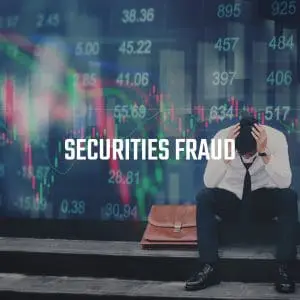 According to the Federal Trade Commission (FTC), consumers reported losing almost $8.8 billion in 2022, a 30 percent increase over the previous year. Investment scams were responsible for almost half ($3.8 billion) of the money lost by consumers. Most of those investment scams are a form of securities fraud because they encourage investors to make purchase or sales decisions that are based on false information. Given the magnitude of consumer losses attributable to securities fraud, it should come as no surprise that federal authorities aggressively investigate and prosecute allegations of securities fraud. If you believe you are under investigation for or have already been charged with securities fraud, you need the advice and guidance of an experienced federal securities fraud defense attorney immediately.
According to the Federal Trade Commission (FTC), consumers reported losing almost $8.8 billion in 2022, a 30 percent increase over the previous year. Investment scams were responsible for almost half ($3.8 billion) of the money lost by consumers. Most of those investment scams are a form of securities fraud because they encourage investors to make purchase or sales decisions that are based on false information. Given the magnitude of consumer losses attributable to securities fraud, it should come as no surprise that federal authorities aggressively investigate and prosecute allegations of securities fraud. If you believe you are under investigation for or have already been charged with securities fraud, you need the advice and guidance of an experienced federal securities fraud defense attorney immediately.
The federal government has virtually unlimited resources with which to investigate and pursue suspected securities fraud activities. If you are the target of a federal investigation and/or prosecution, you need a powerful advocate on your side. Attorney David Haas is that advocate. As a former federal prosecutor himself, attorney David Haas has invaluable first-hand knowledge that can be used to your advantage.
What Is Securities Fraud?
The term “securities fraud” covers a range of activities that involve deceiving investors and/or the manipulation of financial markets for illegal gain. Many allegations related to securities exchange fraud are governed by the Securities Exchange Act of 1934 Section 10(b) which states, in pertinent part, as follows:
“It shall be unlawful for any person, directly or indirectly, by the use of any means or instrumentality of interstate commerce or of the mails, or of any facility of any national securities exchange… [to] use or employ, in connection with the purchase or sale of any security registered on a national securities exchange or any security not so registered, or any securities-based swap agreement… any manipulative or deceptive device or contrivance in contravention of such rules and regulations as the Commission may prescribe as necessary or appropriate in the public interest or for the protection of investors.”
Securities and Exchange Rule 10b-5 sheds further light on what activities may potentially constitute securities fraud, stating that “it shall be unlawful for any person to:
- Employ any device, scheme, or artifice to defraud.
- Make any untrue statement of a material fact or to omit to state a material fact.
- Engage in any act, practice, or course of business which operates or would operate as a fraud or deceit upon any person, in connection with the purchase or sale of any security.
Finally, 18 U.S.C. § 1348 makes it a crime to “knowingly execute, or attempt to execute, a scheme or artifice…
- To defraud any person in connection with any commodity for future delivery, or any option on a commodity for future delivery, or any security of an issuer with a class of securities registered under section 12 of the Securities Exchange Act of 1934 (15 U.S.C. 78l) or that is required to file reports under section 15(d) of the Securities Exchange Act of 1934 (15 U.S.C. 78o(d)) OR
- To obtain, by means of false or fraudulent pretenses, representations, or promises, any money or property in connection with the purchase or sale of any commodity for future delivery, or any option on a commodity for future delivery, or any security of an issuer with a class of securities registered under section 12 of the Securities Exchange Act of 1934 (15 U.S.C. 78l) or that is required to file reports under section 15(d) of the Securities Exchange Act of 1934 (15 U.S.C. 78o(d));
What Are Some Common Examples of Securities Fraud?
Just as there are virtually an unlimited number of ways to legally reap financial gains by investing, there are also a virtually limitless number of ways to commit security fraud. Some common examples of securities fraud schemes and activities include:
- Ponzi schemes
- Pyramid schemes
- Pump and dump schemes
- High-yield investment fraud
- Stock fraud
- Advanced fee schemes
- Foreign currency fraud
- Hedge fund-related fraud
- Penny stock fraud
- Cryptocurrency fraud
- Late day trading
- Insider trading
What Are the Potential Penalties If I Am Convicted of Securities Fraud?
Security fraud falls under the umbrella of crimes referred to as “white-collar” crimes. These are non-violent offenses usually committed for financial gain. Although securities fraud is a white-collar crime, there are very serious potential penalties for a conviction, including up to 25 years in jail and up to a $5 million fine. The average term of imprisonment for securities and investment conviction is around four years, according to the U.S. Sentencing Commission.
Do I Have a Defense If I Am Accused of Securities Fraud?
Securities fraud schemes typically involve complex financial transactions, making them difficult to investigate and prosecute. The complex nature of these schemes also causes innocent victims to be charged with criminal intent when they had none. Only an experienced federal securities fraud defense attorney can evaluate your situation and discuss defenses available to you; however, some common defenses used in securities fraud prosecutions include:
- Lack of intent. The government must prove that you had the requisite intent to defraud to convict you of securities fraud. Your attorney may be able to show that, to the contrary, you engaged in what you believed to be legitimate investment activities.
- Substantial assistance. If you provide “substantial assistance” to the authorities during the investigation/prosecution of a securities fraud case, the prosecutor can ask for your sentence to be reduced or even suspended.
- Illegal search and seizure. If law enforcement authorities conducted an illegal search that resulted in the seizure of evidence in a securities fraud case, your attorney may be able to get that evidence excluded from trial, meaning the prosecution will not be able to rely on that evidence.
Get Help from an Experienced Federal Securities Fraud Defense Attorney
If you are the target of a federal securities fraud investigation or you have formally been charged with a crime, you need an experienced federal securities fraud attorney on your side as soon as possible to protect your freedom and your future.
At Haas Law, we have the experience, resources, and skills needed to take on the federal government in securities fraud investigations and prosecutions. When you need to level the playing field, you need attorney David Haas.
Call us at 407-755-7675, chat with us online, or submit our online form today. Because we understand that time is of the essence when federal law enforcement authorities are investigating you, our calls are answered 24 hours a day, allowing you to schedule an appointment as soon as possible to discuss your legal options.
